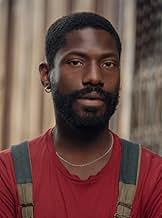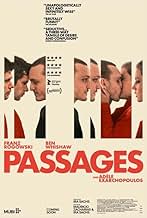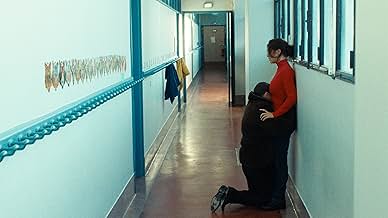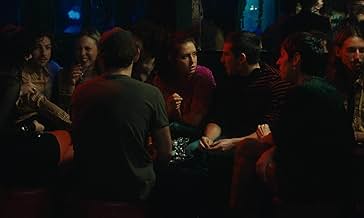Trata de dos hombres que llevan quince años juntos y de lo que ocurre cuando uno de ellos tiene una aventura con una mujer.Trata de dos hombres que llevan quince años juntos y de lo que ocurre cuando uno de ellos tiene una aventura con una mujer.Trata de dos hombres que llevan quince años juntos y de lo que ocurre cuando uno de ellos tiene una aventura con una mujer.
- Dirección
- Guionistas
- Elenco
- Premios
- 4 premios ganados y 25 nominaciones en total
Thibault Carterot
- Thibault
- (as Thibaut Carterot)
Theo Gabilloux
- Young Actor
- (as Théo Gabilloux)
- Dirección
- Guionistas
- Todo el elenco y el equipo
- Producción, taquilla y más en IMDbPro
Opiniones destacadas
This is a very grounded film that challenges the viewers morality and values. The "Peter Pan" protagonist is a hedonistic director fumbling through love and life and refusing to "grow up". He thinks everyone will accept his choices because he assumes the world is on the same page: reality hits very differently. I like the exploration of queerness in this film and the torments of fluidity.
The performances are quite spectacular, especially by Adèle Exarchopoulous. Time and again she proves to be sexy, vulnerable, exquisite in every frame.
Franz Rogowski has a very Phoenix brothers quality to him and portrays the complex and haunted character very effectively, navigating from sexy, commanding, vulnerable to selfish and self-centered.
A very simple film about very complex humans. I think the cinematography, the casting, the writing, the direction all point to a masterful filmmaking that delves deeply into the contemporary human condition where we all still have a very long way to go before accepting each other for who we are.
The performances are quite spectacular, especially by Adèle Exarchopoulous. Time and again she proves to be sexy, vulnerable, exquisite in every frame.
Franz Rogowski has a very Phoenix brothers quality to him and portrays the complex and haunted character very effectively, navigating from sexy, commanding, vulnerable to selfish and self-centered.
A very simple film about very complex humans. I think the cinematography, the casting, the writing, the direction all point to a masterful filmmaking that delves deeply into the contemporary human condition where we all still have a very long way to go before accepting each other for who we are.
More promise than execution, "Passages" tackles twentysomethings navigating gender fluid sexuality with Paris as the backdrop. Welcome to the Tomas, Martin and Agathe dance. Narcissist and disagreeable German film director, Tomas is the unfortunate rotten core here. His marriage to Martin is disrupted by a purely sexual tryst with fetching schoolteacher Agathe, and Tomas can't wait to gush about his walk on the straight side to his husband. Things don't go well.
An interesting premise for sure, but one that plays out sloppily, without any character development to speak of, unless Tomas' deplorable indifference counts. An ugly persona, with an appearance to match - a patchy beard, gaunt features, a snaky lisp and a horrific wardrobe (which ironically, is getting kudos from GQ) - it's a bit of a puzzle as to his alure. Surprisingly, he's quite dull to boot, which makes for an odd protagonist: a difficult one to hate, or care for.
"Passages" takes stabs at the French New Wave, dishing up randy youth moving aimlessly through Paris to a jazzy backdrop, but with the exception of a lovely, film-closing evening bike ride, doesn't hit the mark. Without style, the absence of substance dominates this lackluster experience.
An interesting premise for sure, but one that plays out sloppily, without any character development to speak of, unless Tomas' deplorable indifference counts. An ugly persona, with an appearance to match - a patchy beard, gaunt features, a snaky lisp and a horrific wardrobe (which ironically, is getting kudos from GQ) - it's a bit of a puzzle as to his alure. Surprisingly, he's quite dull to boot, which makes for an odd protagonist: a difficult one to hate, or care for.
"Passages" takes stabs at the French New Wave, dishing up randy youth moving aimlessly through Paris to a jazzy backdrop, but with the exception of a lovely, film-closing evening bike ride, doesn't hit the mark. Without style, the absence of substance dominates this lackluster experience.
- hipCRANK.
This movie's faint appeal as a post-modern take on a love triangle seems exhausted by the implausible image, featured in many promotional cards, of Franz Rogowski's sneering Tomas jazz-snuggling up to Adèle Exarchopoulos' Agathe on a dance floor. Tantalizing, but no, the film does not explain how this pair makes any chemical, emotional, or even symbolic sense. Franz Rogowski has a convincing restraint and charisma as an outsider in films like "In den Gängen" or "Transit," but here, cast in a sexual melodrama (between characters Tomas, Martin, and Agathe) as a self-obsessed bourgeois, he acts as if he were a guy who manages a cable company by day and was hired for this film because of his eyebrows. That said, Rogowski has little in the script to work with: why any character should care about this selfish oaf is head-ache-making opaque. The script tempts Rogowski into an egotistical flatness, his voice a monotonous whine, whose musical equivalent is a beginner's huffing atonally on a saxophone, alone. The character knows no boundaries. Part demon-child, part mindless fungus, he one minute halts ordinary conversations imperiously and the next shows up uninvited (opening doors himself), babbling needy demands in somebody's dwelling or workplace. Aiming for the top edge of the goal, the filmmakers instead deliver Tomas as a kind of compound of all the silly-shirt, night-scene poseurs in the history of Saturday Night Live, going back to Dan Ackroyd's "wild and crazy guy," Bill Hader's Stefon, and the Roxbury Guys of Ferrell and Kattan. However, Tomas's nylon tank and midriff-baring macrame-top collection beats all of these SNL figures in a race to "ridiculous." We are supposed to believe that a woman, played by Adèle Exarchopoulos, who recalls Monica Vitti and Anna Karina in her voluptuous elegance, toughness, and vulnerability, is obsessed with a sniveling, narcissistic twit, a dying fire-pit of acrid banalities. Unsurprisingly, after about five minutes of film time, Exarchopoulos resonates an odd fatigue incompatible with Agathe's allegedly incandescent fascination with Tomas, and she betrays a glowing concern that the actress, not the character, is in a bad dream: this movie. Ben Whishaw as Martin is such a maestro that he is the only one of the three (in other work excellent) principal actors who can bring himself fully to the script with a believable, developing, pained realization, but the film at large is so full of abrupt, nonsensical leaps of mood and commitment that the whole exercise could be a workshop in which the players were challenged to vitalize premises that make scant sense. Another film that much more convincingly allows the wonderful Adèle Exarchopoulos to play on a plane of "nothing left to lose" is Rien à foutre (2021).
Intimacy can be a beautiful thing. However, it can also become something messy, hurtful and emotionally devastating when tainted by self-serving agendas, irresponsible intentions, or reckless, short-sighted experimentation, influences that can purposely or unwittingly end up wreaking widespread havoc. Such is the case in writer-director Ira Sachs's new domestic drama about a flamboyant, free-spirited gay male filmmaker, Tomas (Franz Rogowski), who impulsively jumps into an impromptu fling with a woman, Agathe (Adèle Exarchopoulos), a relationship that leaves his longtime husband, Martin (Ben Whishaw), unsure of what the couple's future might hold. As time passes, circumstances grow increasingly complicated as each member of this unlikely trio tries to sort out what lies ahead, particularly with the emergence of Tomas's ever-growing thoughtless capriciousness. Some viewers may look upon the story's shockingly reprehensible developments as improbable and appalling, but, sadly, as anyone who has ever watched tabloid TV can probably attest, the events depicted here might not appear as far-fetched as one might think. In that respect, this offering presents a bold, courageous, honest look at what can go awry in situations like this, an account loaded with incensed outrage, unbridled ire, biting humor and more than a little cynicism. It's a narrative that some audience members may find offensive, even deplorable, but, like a horrific car accident, it's also something that many viewers might find difficult to look away from, thanks in large part to the wholly convincing performances of the three protagonists. Sensitive viewers should be aware that the film includes a fair amount of explicit and provocative sexual content, so those easily offended by such material may not want to put this one on their watch lists. However, for those who appreciate domestic dramas that hold nothing back and that aren't afraid to get down and dirty in their portrayals of what can happen, this release is about as good as any out there. Just be prepared to be left with your jaw agape - and your head spinning.
As you see from the trailer a gay man in a gay marriage has sex with a woman. Don't think you'll find out why. You won't. His gay husband is OK with that. Don't know why. He just seems to sleep with one or the other as he pleases and nobody seems to object. There is almost no pressure on him to choose between them so don't expect any drama. I'm not telling you the ending but it's as calm as the rest of the film. Is he in love with either of them? Don't know. So I am giving it a 6. It's not bad but it doesn't go anywhere and doesn't answer any questions about the characters. Given the potential material it's very disappointing.
¿Sabías que…?
- TriviaThe film was rejected by both the Cannes Film Festival and the Venice Film Festival. It ended up having its world premiere at the Sundance Film Festival 2023.
- Citas
Tomas Freiburg: Martin!
Martin: Uh-huh?
Tomas Freiburg: Agathe is pregnant.
Martin: Did you sleep with me to tell me that?
- Bandas sonorasWon't You Buy My Sweet Blooming Lavender
Written by Janet Penfold
Performed by Janet Penfold (uncredited)
Also performed by Franz Rogowski (uncredited)
Selecciones populares
Inicia sesión para calificar y agrega a la lista de videos para obtener recomendaciones personalizadas
- How long is Passages?Con tecnología de Alexa
Detalles
Taquilla
- Total en EE. UU. y Canadá
- USD 551,611
- Fin de semana de estreno en EE. UU. y Canadá
- USD 63,277
- 6 ago 2023
- Total a nivel mundial
- USD 1,116,810
- Tiempo de ejecución1 hora 31 minutos
- Color
- Relación de aspecto
- 1.66 : 1
Contribuir a esta página
Sugiere una edición o agrega el contenido que falta

Principales brechas de datos
What is the Canadian French language plot outline for Pasajes (2023)?
Responda































